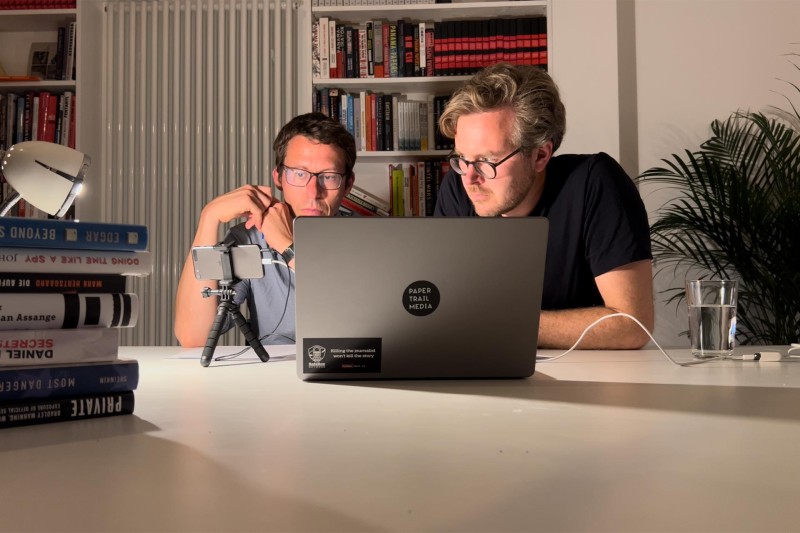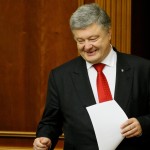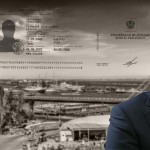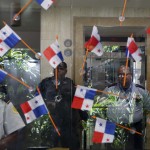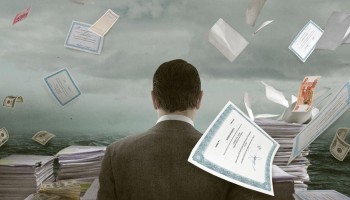The anonymous whistleblower behind the bombshell leak known as the Panama Papers has emerged anew to warn how offshore companies are enabling Russia’s war machine.
John Doe, as the whistleblower insisted on being called, had only spoken out publicly once before, but reached out recently to the two German journalists who had received the leak of documents in 2015 concerning the Panamanian law firm Mossack Fonseca.
Those two reporters from Suddeutsche Zeitung, Frederik Obermaier and Bastian Obermayer, now work for Germany’s Der Spiegel. They agreed to share the transcript of their John Doe interview with OCCRP and other media groups that participated in the award-winning investigation under the umbrella of the International Consortium of Investigative Journalists (ICIJ).
John Doe issued a manifesto weeks after the publication of the Panama Papers in 2016, decrying global inequality and calling on governments to do more to curb the use of offshore companies that hide fortunes of the rich and often of the corrupt.
The reporting, which was rewarded with a Pulitzer Prize, led the leaders of Iceland and Pakistan to resign and sparked global protests.
Governments have since recovered at least $1.3 billion in tax revenues as a result, but John Doe is concerned that rising nationalistic and authoritarian governments are looking to overturn advances in transparency. The interview comes also as the U.S. Congress debates legislation that would make it harder to hide behind shell companies in the United States.
Since 2015, the Panama Papers have spawned books, podcasts, documentaries, and even a Hollywood movie starring Meryl Streep. But the whistleblower has remained silent — until now.
To ensure anonymity, the Der Spiegel reporters spoke to John Doe on an internet call, using software that read out the whistleblower’s answers. The interview, which took place in the presence of a witness, has been shortened for readability, lightly edited and, as is standard practice in German journalism, submitted to the interview subject for authorization prior to publication.
How are you doing? Are you safe?
I am safe, to the best of my knowledge. We live in a perilous world, and that weighs on me sometimes. But overall I am doing quite well, and I consider myself very fortunate.
You stayed silent for six years. Haven’t you been tempted to reveal that it was you who made the secret offshore dealings of heads of states and heads of governments, drug cartels, and criminals public?
I have often wrestled, as I think many people do, with issues of being credited for my work. Fame was never part of the equation. At that stage, the only concern was staying alive long enough for someone to tell the story. Making the decision to compile the data available to me at Mossack Fonseca took days and felt like looking down the barrel of a loaded gun, but ultimately, I had to do it.
You reached out to the German daily Süddeutsche Zeitung, which initiated a collaboration of more than 400 journalists, coordinated by the International Consortium of Investigative Journalists (ICIJ). When you reached out to us, what did you have in mind?
When I contacted you, I had absolutely no idea what would happen or if you would even respond. I corresponded with many journalists who were uninterested, including at the New York Times and Wall Street Journal. Wikileaks, for its part, did not even bother answering when I reached out to them later on. (Editor’s note: the New York Times and Wall Street Journal did not want to comment, and Wikileaks did not respond to a request for comment.)
The global team started to publish the Panama Papers on April 3, 2016. What was that day like for you?
I recall it being like most Sundays. I met some friends for a meal and was stunned to learn that Edward Snowden had supercharged interest by discussing the project on Twitter.
The NSA whistleblower, who now lives in exile in Russia, had somehow found out about the investigation and tweeted even before we had published about the “biggest leak in the history of data journalism.”
I remember seeing the posts fly by on social media by the thousands. It was like nothing I had ever seen. A literal information explosion. The people I was with were talking about it as soon as they heard. I did my best to act the way anyone else hearing about it for the first time would have.
Many experts compare the Panama Papers with Watergate. The most important Watergate source was Associate FBI Director Mark Felt, who went under the name “Deep Throat” and finally revealed his identity 33 years after Watergate ...
I have thought about Mark Felt from time to time and the types of risks he faced. My risk profile looks a bit different than his. I may have to wait until I’m on my deathbed.
“The Panama Papers involve so many different transnational criminal organizations, some of them with links to governments, that it’s difficult to imagine how it could ever be safe to identify myself.”
John Doe
Why is that?
The Panama Papers involve so many different transnational criminal organizations, some of them with links to governments, that it’s difficult to imagine how it could ever be safe to identify myself. Felt primarily had to worry about Richard Nixon and his cronies, and Nixon resigned just a little more than two years after the break-in, rendering him powerless. Even in 50 years, it’s likely some of the groups I worry about will still be with us.
Did you tell anyone at all about your role in the Panama Papers?
After the news broke, I told only a few of the people I care about most.
So, you have remained silent now for six years. Why do you want to speak up now?
There have been several occasions over the past six years where I have been tempted to speak up. At each one of those points, it has seemed like the world was careening closer and closer toward catastrophe, and so the need to attempt to intervene has always seemed increasingly urgent. At the same time, however, I have had to balance a few factors.
What exactly are you referring to?
First, of course, is my own physical safety, and that of my family. And second is the fact that the world is a big place with a cacophony of voices all trying to get their point across. I wanted my words to carry meaning, not to get lost before the next Donald Trump tweet. In 2016, I wrote of my fear based on what I was witnessing, “that severe instability could be just around the corner.” I am afraid that instability has finally arrived.
What kind of instability do you mean?
The rise of fascism and authoritarianism globally, from China to Russia to Brazil to the Philippines, but especially now in the United States.
America has made some terrible blunders in its history, but it has served as a balancing force against the absolute worst regimes when needed most. That balance has functionally ceased to exist.
Tax havens seem to be of crucial importance for strongmen in autocratic regimes.
Putin is more of a threat to the United States than Hitler ever was, and shell companies are his best friend. Shell companies funding the Russian military are what kill innocent civilians in Ukraine as Putin’s missiles target shopping centers. Shell companies masking Chinese conglomerates are what kill underage cobalt miners in the Congo. Shell companies make these horrors and more possible by removing accountability from society. But without accountability, society cannot function.
“Shell companies funding the Russian military are what kill innocent civilians in Ukraine.”
John Doe
The Panama Papers seem to be more relevant than ever, due to the Russian aggression in Ukraine. For example, one of the oldest and closest friends of Vladimir Putin, the cellist Sergei Roldugin, got sanctioned at the end of February. The main reason for that has been found in the Panama Papers, which showed that Roldugin seems to have acted as a proxy for his powerful friend and owns billions — at least on paper. Are you pleased about that twist of events?
I was glad to see Roldugin sanctioned. I think it’s brilliant.
Do you fear Russia might seek revenge?
It’s a risk that I live with, given that the Russian government has expressed the fact that it wants me dead. Before Russia Today’s media presence was curtailed due to Russia’s attack against Ukraine, it aired a two-part Panama Papers docudrama featuring a “John Doe” character who suffered a torture-induced head injury during the opening credits, after which a cartoon boat sailed through the pool of his blood, as though it were the Panama Canal. However bizarre and tacky, it was not subtle. We have seen others with connections to offshore accounts and tax justice resort to murder, as with the tragedies involving Daphne Caruana Galizia and Ján Kuciak. Their deaths affected me deeply, and I call upon the European Union to deliver justice for Daphne and Ján and their families. And to deliver rule of law in Malta, one of Mossack Fonseca’s former jurisdictions.
In 2017, the German Federal Police got a ton of documents from Mossack Fonseca, also from an anonymous source.
Yes, that was me. From the beginning, I was willing to work with government authorities because it seemed quite clear to me that there needed to be prosecutions for the crimes described in the Panama Papers. More than any other, the German government assured me that it would keep me and my family safe; and after some time, we were able to work out an arrangement that seemed fair. Unfortunately, the German government violated its agreement soon after, and from my vantage point, put my safety at risk. Regrettably, I would not recommend that others trust the assurances of the German state.
According to media reports, you were rewarded with 5 million euros. Why are you unhappy with the German Federal Police?
There were three major problems. First, once the German Federal Police had the data, I was essentially left on my own to defend myself with no protection of any sort. I felt this was unwise as the threat to my safety did not diminish at all, and, if anything, increased. Not long after, there was an FSB-linked murder in Berlin in broad daylight. That could have been me. Second, the German government did not actually honor the financial arrangement that we agreed to. That caused additional problems that jeopardized my safety. Third, the German Federal Police have repeatedly turned down the opportunity to analyze more data about the offshore world beyond the Panama Papers, which is frankly shocking. (Editor’s note: the German Federal Police declined to comment.)
So, you don’t think the German authorities did enough to keep you safe?
I want to be fair to them. They did offer some small degree of protection, but this is a type of situation where it only takes one mistake to yield a disastrous and irreversible result. For a number of reasons, I was not comfortable with their overall approach, especially as time went on. If the German government had truly appreciated the importance of the Panama Papers, I am confident that it would have been handled much differently.
What exactly did you want from the German Federal Police? Witness protection? A new identity? Or more money?
I can only say that they have not honored the financial arrangements we agreed to.
German police have shared Mossack Fonseca data with dozens of countries, but they limited it to data about citizens of the country in question. According to this logic, data about oligarchs could only be shared with Russian authorities, unless there are criminal investigations in other countries — an absurd situation, especially given that these men have recently been sanctioned in response to the Russian invasion of Ukraine.
Unfortunately, neither the governments of Germany nor the United States have expressed much interest in the Panama Papers. Instead, they are focused on yachts. Frankly, yachts do not matter very much, beyond symbolic value. Offshore companies and trusts matter. Sanctions are one important tool but there are others. For example, the United States could raid some of the offshore incorporators’ offices on American soil to send the signal that this type of activity is no longer acceptable. It would be easy for them to do. But it hasn’t happened.
The Russian elite routinely hides ownership of luxury homes, yachts, jets and other assets through complex offshore arrangements. How can this be stopped?
I think the Western world viewed Vladimir Putin as a nuisance for a long time, but one that they could control with economic incentives. Obviously, that has not worked. It would take a truly extraordinary effort, a kind of modern-day Manhattan Project, where the goal would be the untangling of the enigmas of the offshore world. Certainly, the computational capacity to do this exists. The question is whether the political will does. So far, I have not seen much evidence.
Why do you think we haven’t seen a major Russian whistleblower yet?
Even given some requisite amount of bravery, it also takes a certain degree of freedom to become a whistleblower. Someone has to be there to listen and there must be at least some desire to make change. Apart from the fact that Putin murders and imprisons the brave, it’s very hard to find that kind of freedom in a place like Russia.
Edward Snowden is trapped in Russia. Even though he criticizes Putin’s government as being corrupt, he cannot leave the country because he would face trial in the U.S.
Snowden is just one puzzle piece in an information war Russia has been waging against the United States for most of the past century. If the American intelligence community has evidence against him, it should lay it out for all to see. If they do not, President Biden should pardon him and welcome him home. It’s really that simple.
How satisfied are you with the impact of the leak?
I am astounded with the outcome of the Panama Papers. What ICIJ accomplished was unprecedented, and I am extremely pleased, and even proud, that major reforms have taken place as a result of the Panama Papers. The fact that there have been subsequent journalistic collaborations of similar scale is also a real triumph. Sadly, it is still not enough. I never thought that releasing one law firm’s data would solve global corruption full stop, let alone change human nature. Politicians must act.
We need publicly accessible corporate registries in every jurisdiction, from the British Virgin Islands to Anguilla to the Seychelles to Labuan to Delaware. Now. And if you hear resistance, that sound you hear is the sound of a politician who must be sacked.
Since 2016, thousands of Panama Papers stories have been published. Are there any you think the world still needs to see?
There are so many untold stories. One that comes to mind is a trust with yellow paper checks that was likely set up for a drug cartel by a Colombian consulting firm, in which a large American bank appears to have allowed direct use of its correspondent bank account with a bank in Panama. Payees’ names were typed on these checks with a typewriter. To call this arrangement unusual would be an understatement – they might as well have issued checks made out of actual red flags.
Edward Snowden once mentioned your case as being the best-case scenario for a whistleblower: You created big impact and are still unknown and free. Is that also how you see your role?
I count myself as incredibly lucky that everything has worked out as well as it has, even if nothing is perfect. Remaining unknown has had the obvious benefit of keeping me relatively safe, but there has been a cost as well, which is that I have not been able to keep the issue in the public eye the way that Edward Snowden did regarding the NSA wiretapping revelations. Of course, he paid with his freedom to some degree. There are always trade-offs.
What has your leak taught you about whistleblowing?
I would say the most important thing is that my example shows that it is possible, although perhaps rare, to make a major difference and still maintain a good life. But it takes a lot of work and a lot of luck to stay one step ahead.
Is there anything you would recommend to potential whistleblowers?
Telling the truth about sensitive matters is never easy. I would say that an underappreciated factor is just how difficult it is to keep a level head. Whether you are talking to journalists or government authorities, be prepared for everything to move very slowly. It’s important to just breathe and find other things to think about from time to time.
If you could turn back time, would you blow the whistle again?
In a heartbeat.
